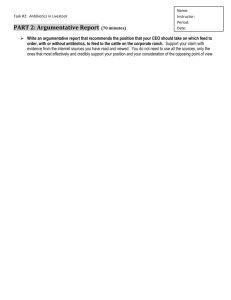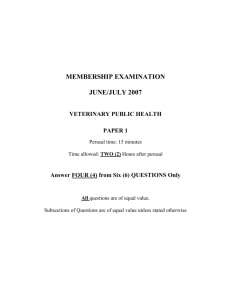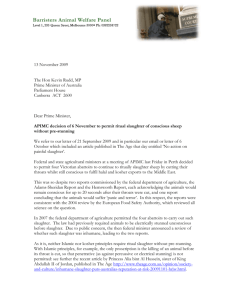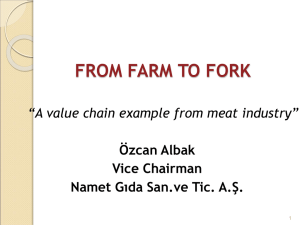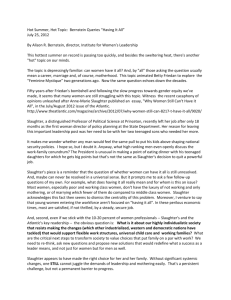Hot, Crowded and Legal
advertisement
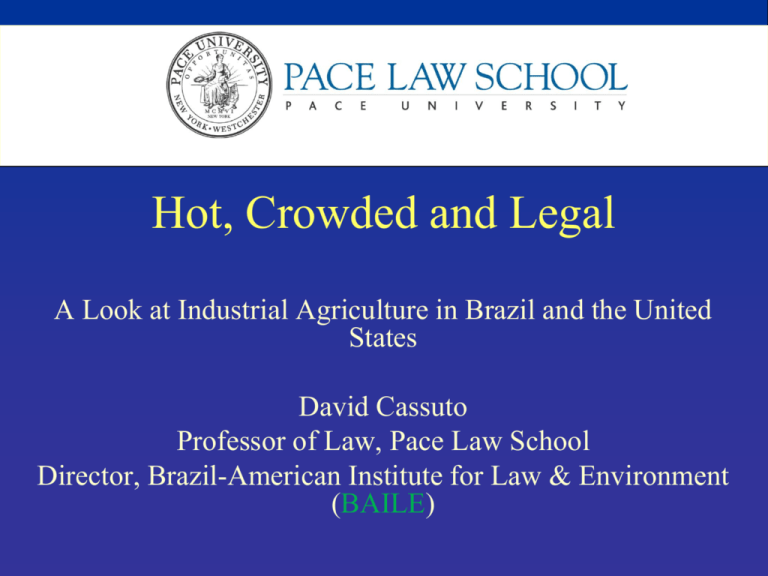
Hot, Crowded and Legal A Look at Industrial Agriculture in Brazil and the United States David Cassuto Professor of Law, Pace Law School Director, Brazil-American Institute for Law & Environment (BAILE) Why CAFOs? • Global Climate Change • Air and Water Pollution from Waste • Animal Abuse • Deforestation • > ½ World’s cow, pig, fowl, eggs A Climate Change Feedback Loop • Increased global demand for meat spurs conversion of forests to pasture and fields on which to grow feed crops. • This requires more fossil fuel-based fertilizers and increases manure production. This in turn exacerbates carbon, methane and nitrous oxide emissions. • Emissions accelerate climate change, causing a positive feedback loop for the CAFOs. • Elevated temperatures negatively impact animal feed crops, facility climate control costs and pesticide efficacy. • These increased costs require more volume, which requires more demand, which requires more conversion of forests to fields, etc. Why the U.S. and Brazil? United States Production & Consumption Factory Farm Model Legal Regulation Production & Consumption • 10 Billion per Year Slaughtered • 1 Million per Hour Slaughtered • 9 Million per Year Milked • 67% Protein from Meat (World Average: 34%) • > ½ lb of Meat per Day • 1 lb of Dairy per Day • 200 lbs Meat per Year • 30 lbs Cheese per Year Consumption 110 Grams of Protein per Person per Day Obesity Meat as Social Status & Cultural Significance Increased Disposable Income Government Programs and Subsidies for Meat and Dairy 75% Vegetarians Resume Meat-Eating Factory Farm Model Economic Model: Massive Production Weight > High Attrition Rate Achieved By: Space Feed Antibiotics Waste Lagoons Hormones (Non-Enviro)Legal Regulation • FDA – Food Drug and Cosmetic Act • USDA – Humane Method of Slaughter Act (HMSA) – Twenty Eight Hour Law – Practice Guidelines & Standards • NOT the Animal Welfare Act! Factory Farm Model Pillar: • Space • Feed • Antibiotics • Waste Lagoons • Growth Hormones Regulating Body: • USDA • FDA • FDA & USDA • USDA • FDA Food, Drug, & Cosmetic Act • Feed – Bans Feeding Ruminants Mammal Tissue • Hormones – Approved for Beef & Dairy Cattle – Banned for Chickens & Pigs • Antibiotics – Approves Safe Drugs – Maximum Residue Limits at Slaughter USDA • Humane Method of Slaughter Act – Express Goals: Industry Interest • Twenty Eight Hour Law – Transport Requirements for Mammals • Practice Guidelines & Standards – Poultry Best Commercial Practices – Lagoon Standards FDA & USDA Covers: Do Not Cover: • • • • • • • • Antibiotic Levels preSlaughter • Most Feed Slaughter Transport Antibiotics at Slaughter Limited Feed Regulation Allows Hormones Allows Minimal Space Lagoon Structure FDA & USDA Covers: • • • • • • • Do Not Cover: • Antibiotic Levels preSlaughter Slaughter Transport • Most Feed Supports CAFO Economic Model! Antibiotics at Slaughter Limited Feed Regulation Allows Hormones Massive Production Weight > High Attrition Rate Allows Minimal Space Lagoon Structure United States Consumption Increasing Laws and Regulations Reinforce the CAFO Model Brazil • • • • Trends in Developing World Production Regulatory Regime Good Agricultural Practices Trends in Developing World • Meat Industry Movement: From US & EU to Developing World • Embracing Meat Industry: Perceived Indicator of Economic & Social Progress • Increases in Meat Consumption Brazilian Production Largest Cattle Herd in the World Leading Global Exporter of Cow, Poultry, Pig Government Investment & Credits Regulatory Regime • Federal Anti-Cruelty Decree # 24,645 of 1934 – Mandates standards of cleanliness, personal space and access to air & light; – Sets standards for “humane” slaughter; • Permanent Technical Committee on Animal Welfare of 2011 – Propose and Coordinate Good Practices “Good” Practices Include Welfare before Slaughter Voluntary Programs Industry Leads with Government Support Battery Cages & Gestation Crates Still Used by the Millions Brazil Embracing Status as Global Leader Welfare Protections Systems are New Limited Protections Support CAFO Model US & Brazil • Exemptions • Narrow Regulations • Bovine Growth Hormone • Industry Lobby AntiWelfare • • • • New Area of Law Covers More Animals No Growth Hormones Industry Leading in Establishing Standards So What? • Myths Make Reality • Prevailing Myth of Costs and Benefits is Wreaking Havoc • Externalized Harms, Statistical Lives etc. • Neither animals nor the environment can ever count • It’s Not Just Ethics – It’s Math dcassuto@law.pace.edu
